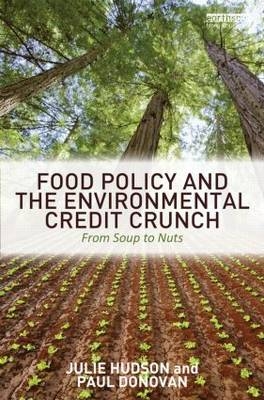
Food Policy and the Environmental Credit Crunch
From Soup to Nuts
Seiten
2013
Routledge (Verlag)
978-0-415-64401-3 (ISBN)
Routledge (Verlag)
978-0-415-64401-3 (ISBN)
The changing economic environment for the consumer that is emerging from the wreckage of the financial credit crunch plays directly into the importance of food spending. This is certainly true from the perspective of food prices in the short run, but also from the perspective of sustainability and reducing the impact of the environmental credit crunch. The economic changes we experience now have a bearing on our ability to manage the environmental credit crunch that looms.
Food Policy and the Environmental Credit Crunch: From Soup to Nuts elaborates on the issues addressed in the authors’ first book, From Red to Green?,and asks whether the financial credit crunch could ameliorate or exacerbate the emergent environmental credit crunch. The conclusion drawn here is that a significant and positive difference could be made by changing some of the ways in which we procure, prepare, and consume our food.
Written by an economist and an investment professional, this book addresses the economic and environmental implications of how we treat food. The book examines each aspect of the ‘food chain’, from agriculture, to production and processing, retail, preparation, consumption and waste.
Food Policy and the Environmental Credit Crunch: From Soup to Nuts elaborates on the issues addressed in the authors’ first book, From Red to Green?,and asks whether the financial credit crunch could ameliorate or exacerbate the emergent environmental credit crunch. The conclusion drawn here is that a significant and positive difference could be made by changing some of the ways in which we procure, prepare, and consume our food.
Written by an economist and an investment professional, this book addresses the economic and environmental implications of how we treat food. The book examines each aspect of the ‘food chain’, from agriculture, to production and processing, retail, preparation, consumption and waste.
Julie Hudson, CFA, is a Managing Director at UBS Investment Bank, where she heads up the ESG and Sustainability team established by UBS within its Equity Research division at the end of 2004. Paul Donovan is a Managing Director and Global Economist at UBS Investment Bank. Paul is responsible for formulating and presenting the UBS Investment Research global economic view.
1. Overview: The Great Food Crunch 2. Raw Material Inputs: Mineral 3. Raw Material Inputs: Vegetable 4. Raw Material Inputs: Animal 5. Food Processing 6. Transport 7. Food Wholesaling and Retailing 8. Eating Food 9. Human Health and Food 10. Food Waste 11. Conclusion
| Zusatzinfo | 9 Tables, black and white; 6 Line drawings, black and white; 15 Illustrations, black and white |
|---|---|
| Verlagsort | London |
| Sprache | englisch |
| Maße | 156 x 234 mm |
| Gewicht | 600 g |
| Themenwelt | Recht / Steuern ► EU / Internationales Recht |
| Sozialwissenschaften ► Soziologie ► Spezielle Soziologien | |
| Technik ► Lebensmitteltechnologie | |
| Technik ► Umwelttechnik / Biotechnologie | |
| Wirtschaft ► Volkswirtschaftslehre | |
| Weitere Fachgebiete ► Land- / Forstwirtschaft / Fischerei | |
| ISBN-10 | 0-415-64401-1 / 0415644011 |
| ISBN-13 | 978-0-415-64401-3 / 9780415644013 |
| Zustand | Neuware |
| Haben Sie eine Frage zum Produkt? |
Mehr entdecken
aus dem Bereich
aus dem Bereich
eine Einführung
Buch | Softcover (2024)
De Gruyter Oldenbourg (Verlag)
CHF 41,90


